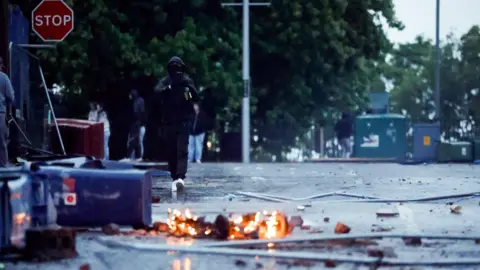The recent events in Northern Ireland, particularly in Portadown and Ballymena, represent a troubling trend of civil unrest and violence that has persisted for several nights. Contrary to the disorder registered earlier, the latest outbreak of conflict seems to have escalated again but at a somewhat diminished intensity. The violence, stemming from an initially peaceful protest, underscores persistent underlying societal tensions within the region.
On Thursday evening, a group in Portadown, located in County Armagh, engaged in violent activities, utilizing bricks and masonry obtained from a dilapidated building to hurl at police officers. This marked the fourth consecutive night of unrest, but authorities reported that injuries to law enforcement officers had decreased from previous days. Earlier in the week, it was disclosed that 41 police officers were injured during violent encounters linked to the demonstrations, while 15 individuals have been arrested in connection with these incidents.
The unrest originally ignited following a peaceful demonstration on a Monday, triggered by allegations of a sexual assault in Ballymena. The transformation from a peaceful assembly to violence reflects a stark trend in Northern Irish society, raising concerns about community relations and public safety.
During the confrontations, police deployed loudspeakers to warn demonstrators in Portadown that use of baton rounds would be necessary if the crowds did not disperse. At the peak, there were approximately 400 protesters gathered in the town center, where a substantial police presence was noted, with over 20 police vehicles visible. The situation escalated to the point where officers donned riot gear to control the crowds, while helicopters patrolled above to maintain surveillance.
Local Democratic Unionist Party (DUP) Member of the Legislative Assembly (MLA) Jonathan Buckley has called for a cessation of violence, emphasizing that no community in Northern Ireland wishes to witness such unrest. He remarked on the disturbing nature of the violent scenes over the preceding days. The situation led to advisories from local housing associations urging residents to adopt protective measures before the anticipated outburst.
Simultaneously, the town of Ballymena also saw police action, notably in the Clonavon Terrace area, where a heavy police presence was established in anticipation of further disturbances. Nonetheless, compared to previous evenings, reports suggested a notable absence of violent activity in this region.
In contrast, an anti-racism protest in West Belfast earlier the same evening proceeded without incident, with around 100 attendees peacefully assembling to voice their concerns against racism. This gathering had representatives from various organizations, who took the opportunity to address the crowd and promote their message.
The Chief Constable of the Police Service of Northern Ireland (PSNI), Jon Boutcher, made a poignant statement during a press conference, describing the confrontations in Ballymena as inherently racist. He highlighted the harrowing experiences of families who had sought refuge in their homes, enduring threats and violence directed towards them during the disturbances. His remarks emphasized the need for the community to come together in solidarity against such acts of intolerance.
The Chief Constable’s call for calm was echoed by other officials and community leaders, who warned against turning to violence and warned that legal action would be pursued against those responsible for the disruptions. Furthermore, Boutcher reassured diverse communities that law enforcement agencies remain devoted to their safety and wellbeing, vowing to hold accountable those who instigate violence.
As tensions persist, local officials have stated that measures to restore order would include the deployment of additional police resources from surrounding areas, including support from Police Scotland. These preventative measures are essential, especially in light of the troubling incidents that have resulted in property damage, including the reported arson of a leisure center that had been providing shelter to families impacted by the unrest.
In conclusion, the events unfolding in Northern Ireland are a complex interplay of social strife, influenced by ethnic tensions and individual grievances. The community is left grappling with the consequences of such violence, while leaders across the region call for resolution and unity in the face of adversity. The situation remains fragile, with future protests likely as the community seeks to not only address the recent violent incidents but also the deeper societal issues at play.



